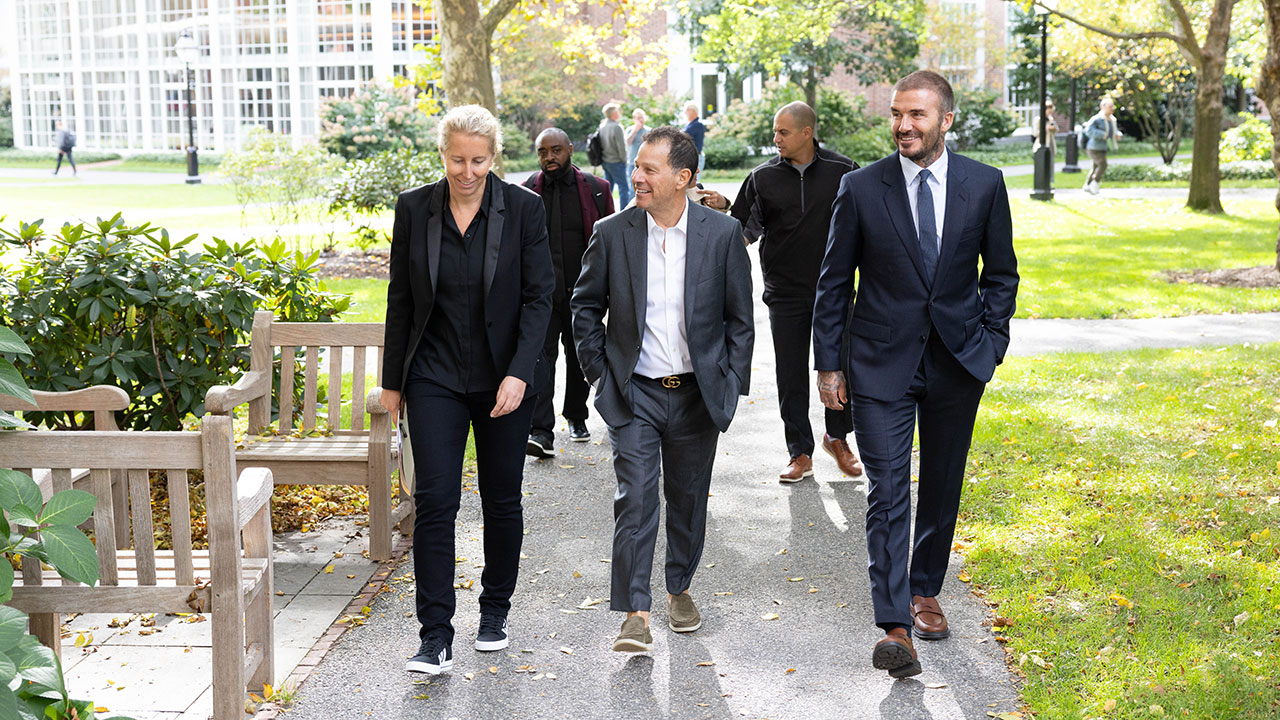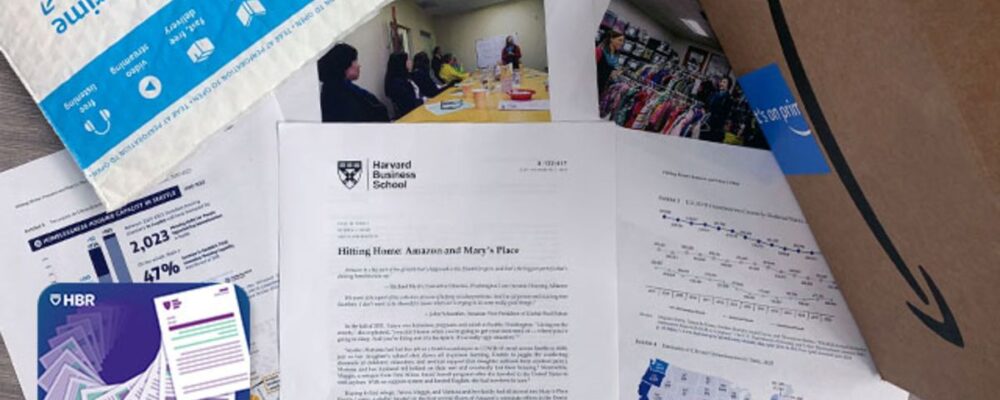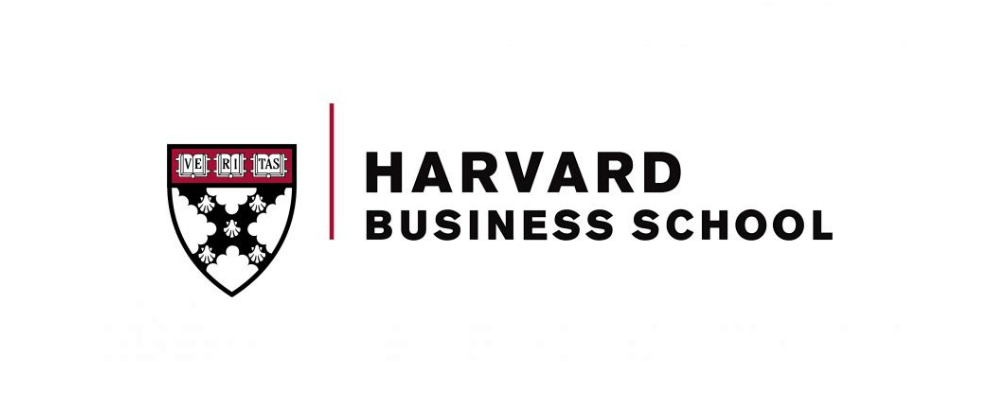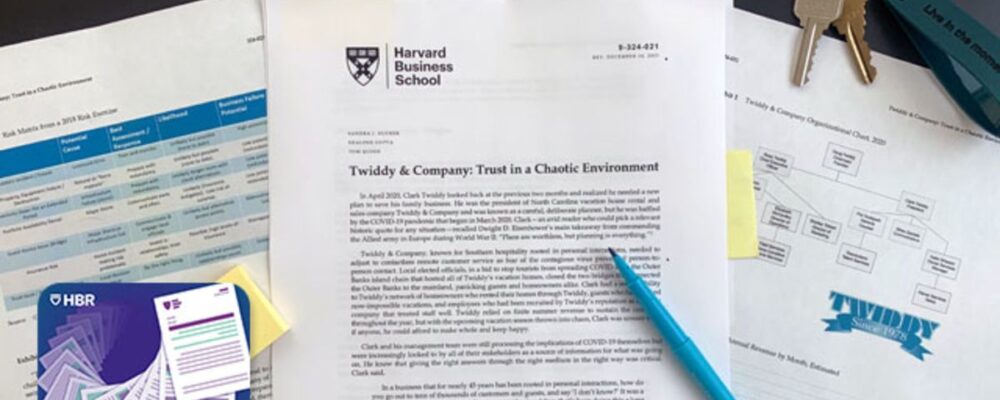Superstar talent brings the kind of wattage that can power a business to the next level, as recent high-stakes decisions facing soccer legend David Beckham show.
Two new Harvard Business School case studies examine the questions Beckham and his team pondered as he transitioned from the world’s biggest sports stage to cementing a legacy as a businessman, entrepreneur, and club owner. What’s the best way to build a team around a top performer? How do you value the asset of a star to the broader organization? And, how can an organization make a star’s power last long after the star’s career ends?
Anita Elberse, the Lincoln Filene Professor of Business Administration at Harvard Business School, got a behind-the-scenes look from Beckham’s team at how the organization considered an offer from Authentic Brands Management for a majority stake, and wooed fellow soccer star Lionel Messi to Beckham’s Inter Miami CF soccer club. Beckham visited Elberse’s MBA class, “The Business of Entertainment, Media, and Sports,” in October to further illuminate the discussions.
“You can build a follower base that’s bigger than what traditional media can offer, and you can reproduce that talent on a much larger scale than before.”
“The reason we wrote these cases is to illustrate the value of star talent,” says Elberse, who coauthored the cases with David Moreno Vicente, a 2019 graduate of HBS who currently works as a consultant. “It doesn’t necessarily have to be someone at the level of David Beckham, but there are stars in all sorts of domains, in all sectors of business. You see this with CEOs who become public figures and are stars in and of themselves.”
Business increasingly orbits these iconic talents, Elberse says. The sports and entertainment sector has become the largest US export in its own right, amplified by the power of social media. “You can build a follower base that’s bigger than what traditional media can offer, and you can reproduce that talent on a much larger scale than before,” Elberse explains. “That fuels the winner-takes-all-market that we see in lots of spaces.”
Cultivating an influential brand
Known for finding the net with improbable bending free kicks, Beckham rose from a working-class English background to captain the English national team and play in three FIFA World Cups. In 2007 at age 31, Beckham brought his talents to US soccer, striking a five-year, $6.5 million-a-year contract with LA Galaxy that positioned him to buy the Major League Soccer’s (MLS) Miami franchise in 2018.
As his two-decade soccer career waned, Beckham’s star remained ascendant in business and entertainment, with deals to endorse Adidas sportswear, Tudor watches, Safilo eyewear, Maseratis, and EA Sports video games. Soon, opportunities to film documentaries for Netflix and Disney+ followed.
“Beckham has managed to keep his brand at a very steady level,” Elberse says. “Usually, it tapers off relatively quickly, but he has stayed in the public eye and as a powerful force for quite some time.”
Beckham (right) and Authentic Brands CEO Jamie Salter (middle), pictured walking with Elberse, shared business insights with MBA students during a visit in October. (Image credit: Evgenia Eliseeva)
Authentic Brands Group, a multinational branding and licensing group, specializes in the business of harnessing star power. Authentic boasted multiple fashion brands, such as Forever 21 and Aeropostale, and a growing fleet of celebrity “icons,” including living legends like Shaquille O’Neal and lasting images of old Hollywood like Marilyn Monroe.
“Authentic is an illustration that even if you’re an organization that doesn’t traditionally rely on these stars or these icons, this is an area you can get in on,” explains Elberse. “Authentic was a collection of brands that were relatively well known but not connected to star power, and then they did a bunch of deals with celebrities where they were realizing, ‘Hey, these could have a really strong impact on the other brands that we have, especially if we put them together.’”
Authentic offered to acquire 55 percent of David Beckham Ventures, the company through which Beckham ran his commercial activities, and give 45 percent of future profits to Beckham. “I’ve asked [Beckham], ‘If we are going to see you on the field at Inter Miami, are you going to wear a Brooks Brothers suit or an Ermenegildo Zegna suit?’ Brooks Brothers is our brand, so I hope he’ll choose the former,” says Authentic Brands Group founder and CEO Jamie Salter in the case about his rationale.
Two stars combine: Messi and Beckham
Beckham leveled up his talent in 2023, working behind the scenes to draw Argentinian legend Lionel Messi to play for his Miami franchise. Coming off a World Cup win, Messi was sought by clubs worldwide. US soccer, despite the investments of Beckham and others, remained relatively small, dwarfed by homegrown sports like football and baseball.
Beckham has committed to building US soccer as part of his legacy, the case says, and brands started flocking to the sport after he joined MLS. Thanks to Beckham, the league now has a “designated player rule”—also known as the “Beckham Rule”—that allowed the US to sign up to three players whose total compensation exceeded the $650,000 maximum and create star-studded teams.
“MLS has really transformed since David Beckham joined the league in 2007,” notes David Gardner, David Beckham Ventures’ president, in the case studies. “MLS teams were worth $50 million back then—now most are worth between $450 and $600 million … And with the Apple deal, people all over the world can tune in and watch MLS games, which should fuel further growth.”
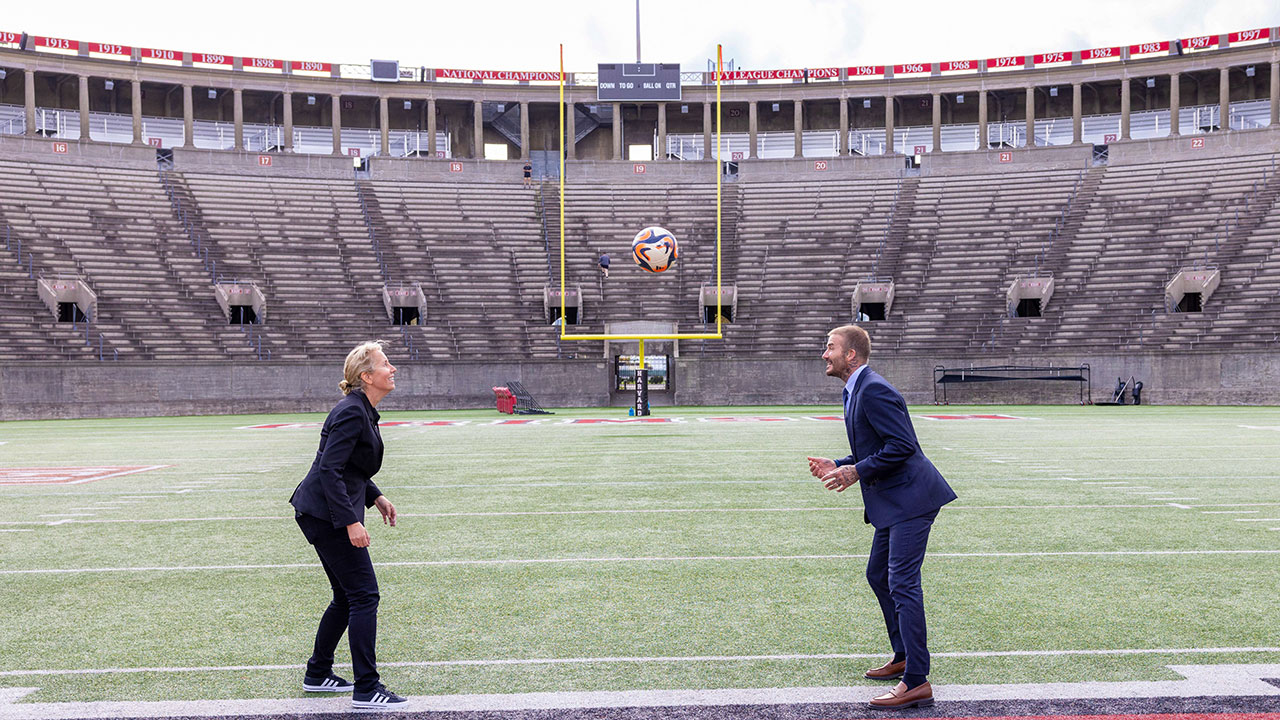
Elberse and Beckham pass a soccer ball inside Harvard Stadium during his visit. (Image credit: Evgenia Eliseeva)
Like Beckham, Messi has proven himself to be the kind of talent around which businesses can build. After Messi signed with the Paris Saint-Germain team in 2021, the club gained 20 million new social-media followers within weeks, stronger growth than any other sports team that year. Similarly, sales of Paris Saint-Germain jerseys jumped 40 percent during Messi’s first five months with the team, compared with the previous year, with 60 percent bearing Messi’s name.
Beckham and his team started courting Messi in a “cloak-and-dagger” meeting with his father in Barcelona in 2019. During the 2022 World Cup, Beckham kept in close touch with Messi, player to player, to share that he knew what he was going through on the world stage, and how agonizing the decision to leave a top European club for the United States could be.
“We wanted them to know we were willing to explore a construct that went beyond him being a player—this was about his post-playing career and his legacy, especially in the US, the world’s biggest commercial market. We took a lot of what David himself has done into what we presented to Messi,” said Inter Miami co-owner Jorge Mas in the case.
It worked. March will mark the beginning of Messi’s first full season with Beckham’s Miami team. “I don’t think Messi would have joined Inter Miami if Beckham played no role in Inter Miami,” says Elberse. “The combination of stars is extra powerful.”
Some questions to ask when working with star talent
The case raises key questions for businesses in sports, entertainment, and media that also apply to many companies that work with highly visible individuals:
How do you manage a team of stars? “A soccer team has 11 players. It’s not one Messi, it’s 11 players,” suggests Elberse. “Executives have to consider how much of their budget they dare to spend on one or more star players, and how much on the other team members. That creates all kinds of really difficult decisions.”
How do you manage talent lifecycles? “Most executives are familiar with customer lifecycles and product lifecycles, but if their business relies on talent, they need to consider talent lifecycles as well,” says Elberse. “It’s inevitable as players get older, they’ll lose performance on the field. Even a Messi is not immune.
“So if you run a business that revolves around talent, the question is, how do you best plan for that inevitable decline of even the best players? How can that talent extend their lifecycles after their active sports careers, like Beckham did so well? How can sports teams best transition to younger talent? And what does all of this mean for how executives should incentivize and reward talent?”
How do you build an infrastructure around a star player?
“Not all bets on star talent pay off in the long run,” notes Elberse, pointing to the New York Cosmos’ soccer club’s experience with star player Pele in the 1970s, which struggled to generate enough momentum to keep going after his retirement. “So the question for executives is, how do you build an infrastructure around these star-talent-recruitment decisions that means you can capitalize on this for the long term?”
You Might Also Like:
Feedback or ideas to share? Email the Working Knowledge team at hbswk@hbs.edu.
Image: AP Photo/Lynne Sladky, Background image generated using artificial intelligence on Photoshop
“Harvard Business School is the graduate business school of Harvard University, a private research university in Boston, Massachusetts. It is consistently ranked among the top business schools in the world and offers a large full-time MBA program, management-related doctoral programs, and executive education programs.”
Please visit the firm link to site


